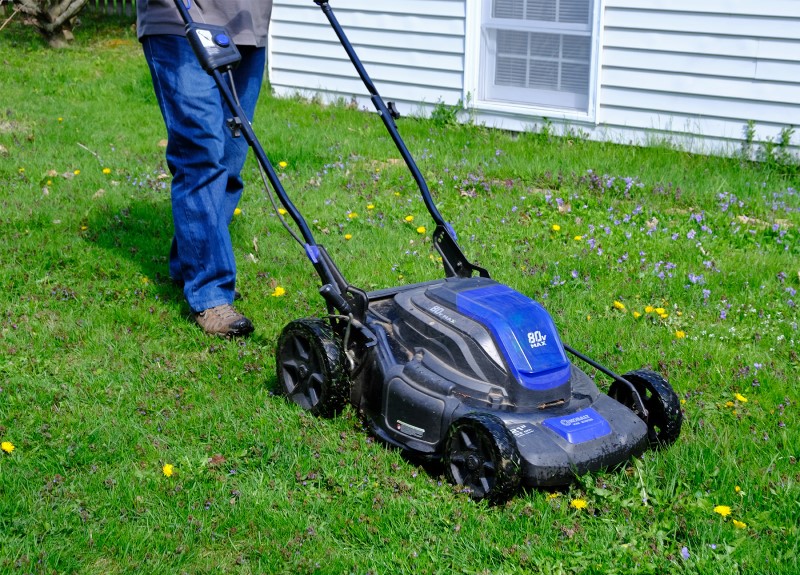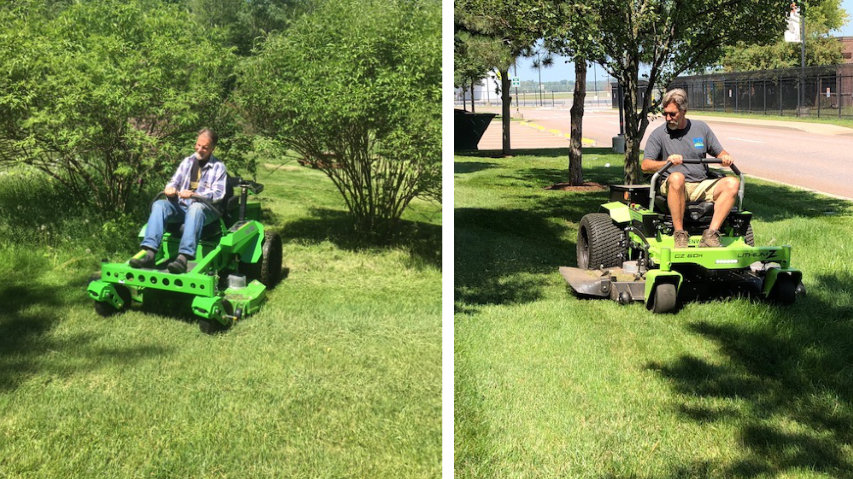Electric Lawn Care Options

Taking care of our properties and landscaping traditionally involves the use of a variety of gasoline powered equipment, including mowers, leaf blowers, trimmers and more. Some property owners have embraced changes to landscaping or reduced the frequency of mowing to reduce impacts, but most homeowners and property management companies continue relying on noisy, smelly and maintenance intensive gasoline-powered lawn care equipment.
Greener options include manual human-powered push mowers or corded electric models that may be worth considering for smaller lawns. Beyond that, battery powered electric mowers and other battery operated lawn care equipment are gaining in popularity as options proliferate with technology improvements and cost reductions – much like what we’ve seen with plug-in electric vehicles over the past ten years.
Today there are many manufacturers offering electric lawn care equipment with varying capabilities and price points. These devices start at the touch of a button (no more cord jiu-jitsu required) and many offer swappable battery packs that can be used across a variety of tools from the same manufacturer. Charging is as easy as plugging into a wall outlet - no more hassles going to the gas station to fill up a portable canister and then keeping dangerous gasoline fuel stored in a garage. They are much quieter than comparable gasoline models so you and your neighbors won’t have nearly the same levels of noise pollution compared to fossil-fuel powered equipment.
The narrower mowing decks and shorter run-times of most battery powered push mowers make them a good fit for smaller yards. If you have a larger area to mow there are options for more powerful walk-behind and riding mowers. A comprehensive listing of different types of electric mowers can be found on the Mow Electric! website.
Battery Powered Push Mowers
- Lower cost - great for smaller lawns.
- Higher voltage models (36+ volt batteries) recommended for larger lawns or longer grass.
- Easier storage compared to gasoline models.
- Self-propelled options are available – generally at higher cost.
- Battery packs can sometimes be swapped out for use in other tools.
- Expect to spend around $300 for basic models with decent ratings.
- There are now over 20 manufacturers of electric mowers for home use, and they are widely available at local hardware stores, home centers and online.
Battery Riding Mowers for Home and Commercial Use
- Residential electric riding mowers providing 1-3 hours of runtime suitable for mowing 2-5 acres on a single charge cost $3,500 - $14,000, depending on the deck size, battery type, durability, etc.
- There are currently nine brands of residential electric riding mowers: eGO, Craftsman, Cub Cadet, DR Power Equipment, Greenworks, Hustler, Mean Green, Ryobi and Turf 0ne.
- Commercial heavy-duty riding mowers with 7+ hours of runtime and 48 to 72-inch mowing decks are available at higher cost (e.g. $10,000-$35,000).
- There are currently four brands of commercial electric riding mowers: Mean Green, Greenworks, Gravely and Toro.

Other electric lawncare tools are also widely available, including chainsaws, leaf blowers, trimmers and more. There are currently more than 20 brands and some offer both home-oriented and professional models suitable for all-day use.
Benefits of Going Electric
Electric equipment usually costs more up front compared to gasoline powered options, but offers significant cost savings on repair and maintenance expenses. For example, the engines and drive systems of conventional mowers have hundreds of moving parts that require regular servicing with inevitable repairs that typically cost hundreds or even thousands of dollars over the life of a conventional mower. On the other hand, electric mowers are relatively simple machines consisting of the electric motors for the wheels and the mower blades, the batteries, cooling fans (on some models), and the wiring/controls - all requiring minimal servicing with very few moving parts to wear out or malfunction. Newer lithium ion battery chemistries and drive motors should remain in service for 10 to 20 years, and are relatively easy to replace if they do fail prematurely.
Another significant benefit of electric lawn mowers is the associated reduction in air pollution emissions. Because conventional gas and diesel lawn mowers have minimal emission controls, they are widely recognized as a major source of air pollution. According to one EPA study, for every 1 hp rating, a typical lawn mower emits the equivalent air pollution of 3.7 automobiles driving at 55 mph. For every 24 hp mower replaced with a comparable electric, the equivalent emissions of 88 cars driving at 55 mph would be avoided per hour of mowing.
Finally, since electric equipment typically produces about one-third the sound of gas counterparts, they are being enthusiastically endorsed by advocacy groups such as Quiet Communities and the American Green Zone Alliance that both advocate for reducing human-caused noise levels and the transition to more environmentally responsible lawn care practices.
Vermont Incentives Available
While most electric lawncare equipment can effectively pay for itself through reduced fuel and maintenance costs (not to mention greater convenience), many Vermonters can get a boost in making a switch to electric lawncare options through incentives available from their electric utility.
As of August 2022 here are incentives available for electric mowers:
- Burlington Electric Department - $100, up to $3,500 for commercial equipment; $40 for leaf blowers, up to $200 for commerical grade
- Green Mountain Power - $75, up to $2,500 for commercial equipment; $25 for timmer, leaf blower or chainsaw, up to $75 for all three.
- Stowe Electric Department - $75, up to $1,250 for commercial equipment; $25 for leaf blowers, up to $75 for commercial customers
- Washington Electric Co-op - $100, up to $1,000 for commercial equipment
- Vermont Electric Co-op - $50, up to $1,000 for commercial equipment
- Vermont Public Power Supply Authority - $100, up to $1,000 for commercial equipment for customers of 12 power utilities across Vermont
More Information
- Mow Electric! - Electric Lawn Care Information and Advocacy
- The Wirecutter - The Best Mower
- Popular Mechanics - Battery Mower Test
- Consumer Reports - Best Battery Mowers Tested